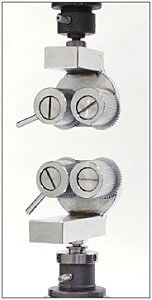1 kN Eccentric Roller Grips

Features:
- Maximum capacity of 1 kN (220 lbf)
- Suitable for testing rubber and soft and hard plastics
- Includes a self-tightening action during testing
- Fitted with parallel-grooved grip faces
Relevant Materials:
Rubber, Soft Plastics, Semi-Hard Plastics
Relevant Specimens:
Plates
These eccentric roller grips are specifically designed for tensile testing flexible materials, such as rubber and soft and semi-hard plastics. Named after the non-symmetric roller design, these grips employ a simple and quick clamping mechanism. They also have a self-tightening action, which maintains clamping of the specimen during testing regardless of any thickness reduction. In addition, the upper and lower grip faces are parallel grooved to help hold these soft materials.
Noticias/eventos
-
New Video: AUTOGRAPH AGX-V2 Voice Operation Device XV-Talk
We will introduce how XV-Talk, the world's first voice control device installed in Shimadzu's latest tensile tester AGX-V2, can be used in various scenarios.
-
New Video: AUTOGRAPH AGX-V2 Operation Control Panel Stand-alone test feature
We will introduce a new feature of Shimadzu's latest tensile tester, AGX-V2, a stand-alone testing function using a large color LCD touch panel.
-
New Autograph AGX-V2 Series Precision Universal Testing Machines
The World’s First Testing Machines Equipped with a Voice Operation Device
-
Nanofibras de celulosa
Given that cellulose nanofibers(CNFs)offer attractive physical characteristics, such as light weight, strength, and hardness, they not only enable materials with advanced functionality, but are expected to be used as a reinforcing material that can reduce the weight of composite materials.
-
Latest issue of Shimadzu Journal, featuring Materials Science, has come out.
This issue focuses on Materials Science particularly on lithium-ion batteries (LiBs). It starts with two customer interviews in which users discuss their relationship with Shimadzu.
-
Hydrogen Energy Analysis Solutions for Quality Control of Hydrogen
Impurities in hydrogen production affect subsequent industrial processes. Strict purity standards have been defined for hydrogen used in fuel cells (ISO 14687-2019). This is because if hydrogen contains carbon monoxide, sulfur components, etc., the catalyst of the fuel cell will be damaged. The hydrogen fuel standard for FCVs (ISO 14687 TypeII GradeD) defines many items to be controlled, and Shimadzu analytical instruments can play a role in analyzing these items.




